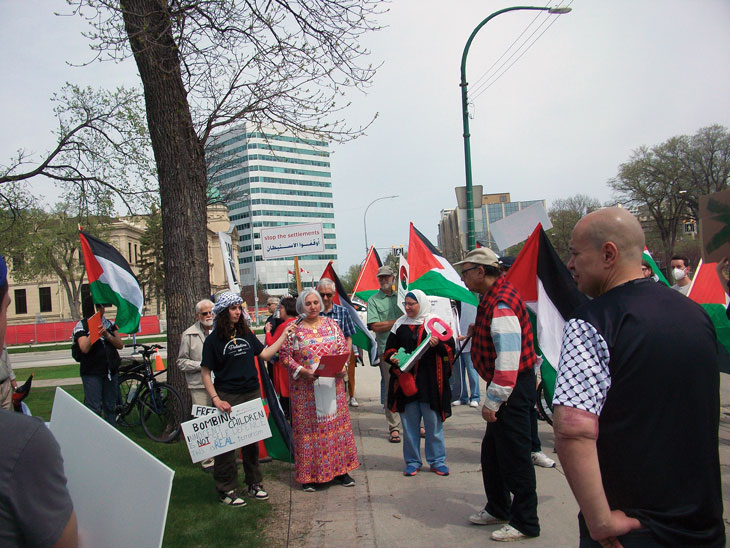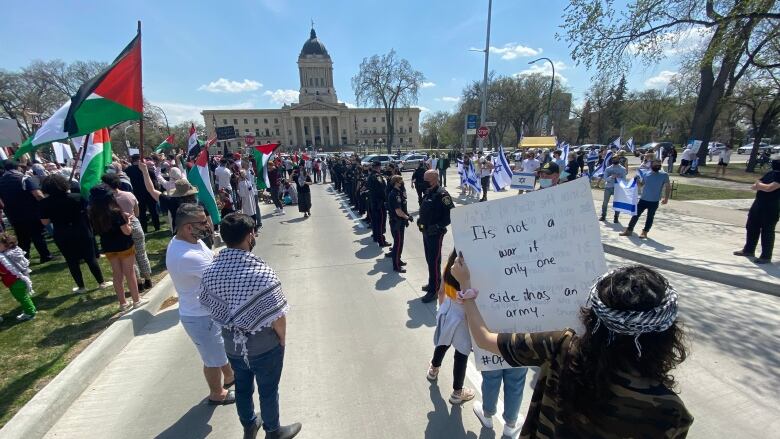
By Candice Bodnaruk
MORE THAN 50 people danced the dabke and flashed peace signs at a peaceful demonstration against the Jewish National Fund (JNF) at the organization’s annual Manitoba fundraising dinner in mid-May.
The JNF Canada website states: “JNF Canada envisions a world where Israel’s communities are supported and healthy, and where generous Canadians can help us build strong foundations for Israel to thrive.”
JNF acquires and develops land in Israel and the occupied territories used for settlements, illegal under international law. In 1972 JNF Canada raised $15 million to create Canada Park. The park is made up of more than 5 million trees planted atop the ruins of three Arab villages destroyed in the Six-Day War. Today the apartheid wall prevents Palestinians living in the West Bank from visiting Canada Park.
The Winnipeg protest, organized by Independent Jewish Voices (IJV), included participants from the Mennonite Church Palestine-Israel Network (MCPIN), Peace Alliance Winnipeg, United Jewish People’s Order (UJPO), Winnipeg Coalition Against Israeli Apartheid (WCAIA), and members of the local Palestinian community. Demonstrators had one central message to the federal government: revoke the JNF’s charitable status.
Those attending the spring fundraiser could not ignore the protest right before their eyes. The event’s venue—on the main floor of a building with a large street-facing window—meant many protesters took the opportunity to get up close and personal with the gala’s guests enjoying a cocktail hour.
Protesters missed the opportunity to confront the event’s guest of honor, Israel booster, and former Canadian Prime Minister Stephen Harper. In 2014 Harper visited the West Bank to lay the cornerstone for the Stephen J. Harper Hula Valley Bird Sanctuary Visitor and Education Center. He was also awarded an honorary doctorate from Tel Aviv University during that visit.

Winnipeg’s Palestinian community and their supporters gathered near Manitoba’s Legislature to mark Nakba 75 on May 13, waving Palestinian flags and holding large banners. People chanted “Free, Free Palestine” and lined up along Broadway Avenue holding large keys and placards with messages like “Apartheid” and “Silence is Compliance.”
Meanwhile a much smaller group from the Israeli Canadian Council stood nearby and waved Israeli flags.
“Canada Recognize Nakba” was the theme of this year’s Nakba remembrance. Many speakers focused on the intergenerational trauma common among Nakba survivors and their descendants.
Nakba survivors (including a Nakba baby, born May 15, 1948) and their families shared stories and explained how the Nakba affects Palestinians living in Canada. One survivor who was born in the 1950s described how his family became refugees in 1948 when they fled to Gaza before he was born; he became a refugee himself in 1967 when Israel invaded Gaza.
“Even though the country has been disfigured and removed from the map of the world, the people of Palestine live on because of their resilience,” he said.
Survivors also explained how the Nakba has followed Palestinians, referencing the 1982 massacre at Sabra and Shatila refugee camps in Lebanon, attacks on Jenin in 2002, and more recent assaults on Sheikh Jarrah and Huwara.

A Christian Palestinian woman also shared her father’s 1948 story of expulsion and his experience of not being able to return to the family home because it was part of the new state of Israel. She brought her father’s Palestine passport to the event to share. She also described her recent visit to Aida refugee camp near Bethlehem, which is known as the most “tear-gassed place on earth.”
Harold Shuster of Independent Jewish Voices-Winnipeg Chapter pointed out that May 15, 2023 was the first time Nakba Day would be officially observed at the United Nations. “The Zionist dream of a land without a people for a people without a land was a lie,” he said. He added it is incumbent upon every single person to do what they can bring an end to Israeli war crimes.
On May 9, New Democratic Party Member of Parliament Alexandre Boulerice introduced a motion in Canada’s parliament to officially recognize Nakba Day. “The Liberal government needs to do a lot more, including enforcing the United Nations resolutions, voting in accordance with our own official position at the U.N. and condemning the oppression, violence and discrimination that Palestinians experience every day,” Boulerice said in the House of Commons.
Although many Canadian cities and provinces have adopted the controversial International Holocaust Remembrance Alliance (IHRA) definition of anti-Semitism over the past year or so, Winnipeg has yet to do so.
At a Human Rights Committee of Winnipeg City Council meeting in late March, grassroots activists showed up en masse to oppose adoption of the definition. The council chose only to receive the motion to adopt the IHRA as information and to review it at a later date.
For opponents of the controversial motion, postponement is a victory. Yet activists say it is important not to be naive and to recognize the fight against the divisive definition is far from over.
In the four-hour meeting, more than 20 presenters spoke, the majority of them opposed to adopting the motion.
Organizer Harold Shuster, with Independent Jewish Voices-Winnipeg Chapter, said it was exactly that grassroots activism against the definition that ultimately led to the committee’s decision. “This was clearly a big win,” Shuster said.
Shuster elaborated: “I think it shows the weakness and arrogance of the supporters of the IHRA who have been able to get away with their behind-the-scenes efforts to convince politicians that all they need to do to fight the epidemic of anti-Semitism is to pass the IHRA definition.”
Shuster added that there are other definitions of anti-Semitism, including the Jerusalem Declaration, that governments could choose to adopt instead of the IHRA.
According to their website, jerusalemdeclaration.org, The Jerusalem Declaration on Anti-Semitism is an attempt to improve the IHRA and act as a non-legally binding alternative to the IHRA. The writers of the Jerusalem Declaration aim to strengthen the fight against anti-Semitism while at the same time protect a space for debate about the future of Israel/Palestine.
As the writers point out, the IHRA limits “legitimate political speech” around Zionism, Israel and Palestine. The definition has 350 signatories of support so far.
Shuster said his organization will continue to educate politicians and the public about the dangers of the definition, specifically using the definition to “throw a large chill” over Palestinian advocacy. He argues this is especially dangerous in academic circles.
Shuster said that local members of the federal New Democratic Party (NDP) have spoken out nationally and have reacted positively to his work on the IHRA. Yet he is extremely disappointed in the provincial NDP, whose leader, Wab Kinew, stood up in the legislature and offered the party’s support for the definition last year.
Shuster is aware that the issue is not over; he pointed out attempts are being made locally and nationally in Canada to insert the IHRA definition into anti-racism strategies and protocols related to areas like “equity, diversity and inclusion” at universities as well as at government agencies and other public institutions.
He said supporters of adopting the IHRA had powerful institutional speakers at the Winnipeg Human Rights Council meeting like Irwin Cotler, Canada’s Envoy on Preserving Holocaust Remembrance and Combating anti-Semitism, as well as representatives from the Center for Israel and Jewish Affairs, while the group speaking against the IHRA were local citizens.
According to Shuster, definitions like the IHRA are never going to get to the root causes of anti-Semitism or any other form of discrimination. In his view, the focus should be on collaborative efforts among all people experiencing discrimination.
Shuster said he would like to believe that groups opposed to the definition are “winning the truth wars.” For all the talk about how this definition is going to bring down rates of anti-Semitism, each year B’nai B’rith reports anti-Semitic incidents have increased. In fact, the definition has the reverse effect. He argued that by confusing anti-Semitism and anti-Zionism, criticisms of the latter get turned into incidents of the former. Passage of the definition would make Israel the only country in the world it would be illegal to criticize.
After living a legal nightmare for 15 years, Dr. Hassan Diab is yet again facing an uncertain future after the French Court of Assize (France’s “anti-terrorist court”) found him guilty this past April of bombing a Paris synagogue in 1980. Yet Diab, a Canadian citizen, was not even in France at the time of the bombing but in fact writing university exams in Beirut.
The Justice for Hassan Diab web page called it a “sham trial” that was politically motivated and unfairly conducted. The case has also exposed major flaws in Canada’s Extradition Act and led activists to call for immediate reform.
The April trial was held in absentia, and since the ruling, advocates for Diab have sprung into action. Supporters of the Carleton University professor are demanding that the Canadian government refuse the extradition request from France.
Diab was arrested in 2008 by the Ottawa police and then extradited to France in 2014. The evidence against him was sparse, consisting only of analysis of what was believed to be Diab’s signature on a hotel registration card. Yet that was enough to convince a Canadian judge to extradite him to France.
He was held for over three years, much of it in solitary confinement, even though he was never put on trial. Finally, in 2018 the French court announced there was no case against Diab on which to base a trial and ordered his immediate and unconditional release.
At that time Diab returned to Canada and resumed a normal life with his family. And then French prosecutors gave in to political and social pressures and ordered a trial.
In a statement to the Washington Report, Roger Clark, a long-time advocate for Diab and former Amnesty International Canada director, noted that there was no jury and no appeal at Diab’s April 2023 trial; secret intelligence was again admitted at trial and hearsay testimony was allowed.
Moreover, supporters note that there was no accurate record of exactly what happened inside the court room during the trial—no transcript or audio or video recording. Two French investigative judges who studied the case for three years also went to the court and urged them not to convict, saying there was no basis for such a ruling and that Diab is innocent.
Late last year, the House of Commons voted in favor of reviewing Canada’s extradition laws and in early June 2023 the Standing Committee on Justice and Human Rights published its final report, “Reforming Canada’s Extradition System.”
“The report was unanimous, representing all-party support,” Clark, who is also a member of the Hassan Diab Support Committee, said. Specifically, the final recommendation in the report asks the Government of Canada to reform the Extradition Act as soon as possible and consider making changes to the extradition process that do not require legislation in the interim, to avoid further injustices in extradition proceedings.
“Prime Minster Trudeau promised publicly to ensure that what happened to Hassan Diab ‘never happens again.’ It is essential that Canada put an end to the injustices inflicted on Hassan Diab,” Clark concluded.
Meanwhile, over 130 members of the Canadian legal community have called on Trudeau and Justice Minister David Lametti to deny France’s request.
Dr. Diab’s supporters are encouraged to write or phone Prime Minister Trudeau’s office and reference Trudeau’s statement. Other actions that can be taken on Diab’s behalf are listed on the Justice for Hassan Diab website at <www.justiceforhassandiab.org>.
(Washington Report)
Candice Bodnaruk has been involved in Palestinian issues for the past 14 years through organizations such as the Canadian BDS Coalition and Peace Alliance Winnipeg. Her political action started with feminism and continued with the peace movement, first with the No War on Iraq Coalition in 2003 in Winnipeg.


Leave a Reply
You must be logged in to post a comment.